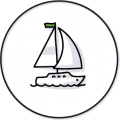Curriculum
What are the benefits and challenges of a nation having two forms of leadership?
- I can name a similarity and a difference between hereditary and elected chiefs.
- I can consider the benefits and challenges of hereditary and elected leadership.
- I can explain how BC first nations came to have two forms of leadership
What aspects of ancient legal systems can be seen in our current world?
- I can name legal milestones from a variety of ancient civilizations.
- I can consider the ways that ancient laws continue to influence us today.
- I can explain how there are consequences for our decisions and actions.
How should we resolve competing claims of ownership over artifacts and cultural sites?
- I can describe the steps I would take if I discovered an artifact.
- What factors would I consider when making a judgement about how archaeologists work with First Nations?
- I can explain why it is important to protect archaeology sites and involve First Peoples in archaeological research.
How do the Canadian and American Systems of Government compare?
- I can explain how Canada’s system of government differs from the United States
- I can analyze the benefits and problems of different systems of government
- I can interact in a group and achieve consensus on an issue.
Who benefits from the different forms of governance and decision-making?
- I can share my learning about governance structures through discussion.
- I can think critically about court decisions.
- I value generational roles in a community and reflect on my own community and identity.
How does the Charter of Rights and Freedoms protect Canadians?
- I can name rights and freedoms that every Canadian has.
- I can analyze how the Charter of Rights and Freedoms protects Canadians and reflects our values.
- I can suggest an additional right or freedom that would make Canada a better place.
How have past governments of Canada used laws to discriminate against Canadian citizens?
- I can describe ways that laws were used to exclude Asian people from entering Canada.
- I can evaluate how Canadian immigration policies have changed over time.
- I can explain why it is important to apologize for past wrongs.
Is Canada fair to everyone who wants to come?
- I can explain how immigration to Canada has changed over time.
- I can analyze whether Canadian immigration laws are fair.
- I can recommend changes to Canada’s immigration policy.
How does the media influence public perception?How can we determine if a media source is trustworthy?
- I can use oral communication skills to share my understanding of reliable media sources with small groups and the whole class.
- I can create arguments defending perspectives presented by media sources.
- I can demonstrate ethical judgments and responses about media and coverage of current events.
What are the causes of poverty and inequality?
- I can share my ideas about how to reduce poverty.
- I can check information, assess my thinking, and develop reasoned conclusions about the causes and consequences of poverty.
- I can describe how aspects of my life experiences, family history, background, and where I live (or have lived) have influenced my understanding of poverty.










